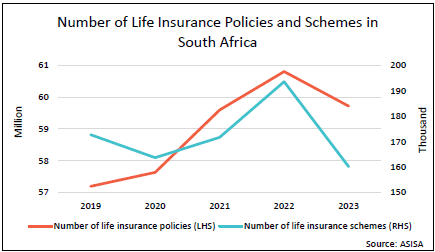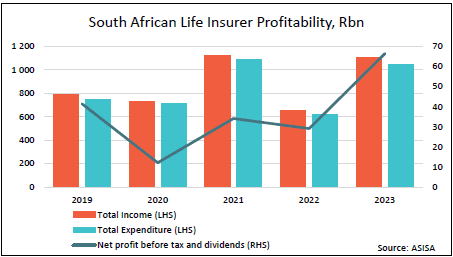South Africa has an emerging aquaculture industry that consists mainly of freshwater species such as crocodiles, trout, catfish, tilapia and ornamental fish, as well as marine species such as abalone, prawns, oysters and mussels. South Africa is a net exporter of fish products, presenting the country with an opportunity to increase its foreign currency earnings.
The untapped potential of this industry could be because of the knowledge gap that exists. According to an aquaculture survey by Britz’s institution ), a few years ago, 85% of interviewees had never heard of the term aquaculture. Of those that had, 30% came from the Western Cape with Gauteng, KwaZulu-Natal and Eastern Cape recording 6%, 8% and 14% respectively. Although the study might be old, bridging this knowledge gap will take time.
Growth status of aquaculture in South Africa
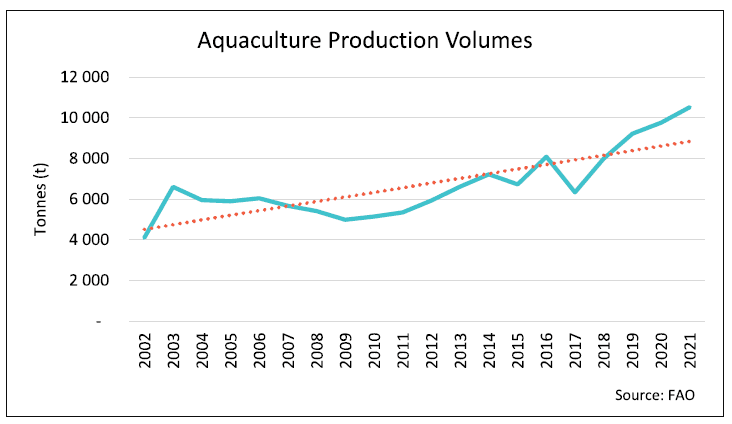
According to the WOW report on ocean and coastal fishing, aquaculture, processing and the wholesale of fish, the industry has shown significant growth as illustrated in the graph. Yet it remains small by global standards.
South African small-scale fish farmers, and there are many of them according to the Hatchery International website, are suffering and not growing due to high costs of production and unstable energy supply.
Regulatory framework for aquaculture in South Africa
The South African fishing industry is regulated by the Department of Forests, Fisheries and Environment, Marine and Coastal Management branch.
There have been some, but insufficient, policy and regulation changes since 1994 aimed at benefitting previously disadvantaged groups. The transformation of the sector, while better than in many other sectors, has been slow, particularly in aquaculture with small-scale farmers and fishers still facing obstacles of high input costs and particularly quotas favouring large-scale commercial farmers.
The Department of Forestry, Fisheries, and the Environment (DFFE) came up with incentives to encourage new entrants such as the Aquaculture Development and Enhancement Programme (ADeP), where qualifying entities can receive between 30%-45% grants towards equipment, infrastructure etc. This intervention was welcomed by the industry, but its implementation and execution is slow.
The size of South Africa’s aquaculture production of about 5,200 tonnes (t) annually pales compared with commercial open ocean fishing producing approximately 477,000t annually. Good intentions of promoting aquaculture must be followed through with execution to realise the high growth potential inherent in this promising industry. It would also contribute to better manage the limited marine resources.
South Africa’s exclusive economic zone and national fishing zones
South Africa’s maritime jurisdiction includes the exclusive economic zones and national fishing zones. The exclusive economic zone extends up to 200 nautical miles (approximately 370km) from its shores, which are determined according to international law.
These zones are managed by the Forestry, Fisheries, and the Environment for exploring, exploiting, conserving, and managing natural resources within this zone.
Small operators find themselves disadvantaged by policies that are more favourable to the commercial farmers who take the lion’s share. In the name of avoiding over-fishing, the allocated quotas have had a negative impact on smaller operators. It is sad to see small family-owned fishing boats anchored in many coastal areas as their permits prohibit them from going out to fish.
Aquaculture to the rescue
With the increase in global demand for fish and the possibility of this demand being met by aquaculture production, there is a growing need for new investments in aquaculture. According to Invest SA, South Africa is one of the largest producers and exporters of abalone and is famous for its farmed premium abalone (Haliotis midae).
The country produces about 1,700t of abalone per year, providing foreign currency earnings. To realise the potential, the government should implement some of the recommendations made by its entity, the Council of Scientific and Industrial Research (CSIR) which identified strategic freshwater aquaculture and eight strategic mariculture areas across the country.
This can also provide career opportunities for the youth, add skilled personnel to the industry, expand markets locally and internationally, and allow more people to set up business in the aquaculture industry.
Life insurance as a business
Life insurance is unlike many other businesses in that it has an uncertain future cost associated with the income it generates from premiums, as it relies on statistics and distribution around the mean. Statistical data such as population life expectancy tables are used by actuaries to determine the likely disbursements in the future in respect of underwritten policies. Actual payments will follow a distribution which may vary considerably from the expected mean value.
If the calculations are within range, the income is lucrative. It is well known that Warren Buffett started his empire focusing on investments in insurance business. Closer to home, Donald Gordon started Liberty Life selling life policies, and Liberty became one of the leading life insurance businesses in South Africa and made him very wealthy.
New trends in the insurance industry
Two new trends are discernible in the insurance business. The share of lower value funeral policies in the life insurance business has skyrocketed and undertakers, banks and insurance companies themselves have jumped on the bandwagon. This aligns with cultural practices and the high cost of funerals.
The table below from the WOW report on the life insurance Industry in South Africa shows that the pandemic changed people’s perception about the probability of loss of life and the resultant noticeable increase in written life insurance. In the face of a calamity, people are more ready to sign life policies. The table also shows that, regardless, life insurance business is forecast to continue to grow in the foreseeable future.
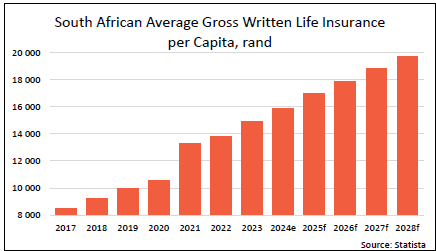
Competition and cheaper premium level of funeral policies is forcing insurance companies to minimise the intermediation costs. They are taking digitalisation and direct online access to products to the next level.
They have been concluding insurance online or by telephone for some time, but the ubiquity of internet access via smartphones has made conclusion of insurance contracts without human intervention on the insurance company’s side possible. Consumers now have the option of comparing different products online, compelling insurance companies to consider flexible product design for prospective clients. Clients’ ability to select options and conclude the purchase of an insurance product online is becoming a norm.
The impact of economic realities on the insurance industry
Economic circumstances remain the backdrop against which growth of insurance business is measured. As the WOW report highlights in the graph below, these have put a damper on recent growth, but not dented the profitability of life insurance businesses.
The regulatory framework
Starting an insurance company in South Africa requires compliance with the Financial Sector Conduct Authority (FSCA) and to fulfil the licensing requirements which include demonstrating financial soundness, having a viable business plan, and meeting governance and operational standards.
Aggressive marketing and pricing can be detrimental to the consumer, as some of the additional costs creep into premiums one way or another. Insurance companies must therefore also comply with stringent governance standards, including having a board of directors of good standing and establishing risk management frameworks. These requirements can make it difficult for smaller players, but the industry remains very lucrative.
The importance of the agrochemical manufacturing industry for South Africa
South Africa’s agrochemicals industry plays an important role and contributes directly to the agricultural sector, which accounts for approximately 2.5% of GDP. Beyond direct contributions, the industry supports agricultural productivity, employment and rural development, and ensures food security.

According to the WOW report on the manufacture of agrochemicals, the industry is growing steadily, but it faces numerous challenges. It is compelled to find innovative and sustainable production methods to boost land productivity and offset the effects of overuse of these chemicals, which can harm the environment and human health.
The agrochemicals sector encompasses a wide range of products, including fertilisers, pesticides, herbicides and plant growth regulators. Countries around the world are looking for solutions to balance the use of pesticides, agrochemicals and fertilisers to combat soil degradation, which can change soil composition and disrupt the balance of microorganisms in the soil.
According to the latest estimates by the Global Environment Facility, about 95% of the earth’s land could become degraded by 2050, while UN estimates show that 40% of all land is already degraded.
According to Science Direct, unbalanced application of agrochemicals leads to environmental degradation and poses numerous challenges to agricultural ecosystems and soil health. The key challenge is to balance improved agricultural production with the safe usage of agrochemicals.
Trends in the Agrochemicals Industry
There is a shift towards precision agriculture and the use of biotechnology and digital solutions which can improve efficiency, reduce environmental impact and improve resource use.
The call for sustainable agricultural practices driven by climate change is compelling countries to adopt eco-friendly and bio-based agrochemicals to align with global sustainability goals and consumer demand for products with less harmful chemicals.
Regulation in the agrochemical industry
The industry is highly regulated with very strong associations such as Crop Life South Africa and Agri-Intel which represent the industry and support the plant protection manufacturing industry to mitigate risks and promote sustainability.
The Genetically Modified Organisms Act (No. 15 of 1997) provides regulatory oversight to ensure rigorous safety assessment of biotech crops. CropLife South Africa acts as a liaison between the Department of Agriculture and the plant science industry to ensure compliance with and enforcement of this Act.
Despite stringent regulation that may hinder industry growth, the country is still plagued by an increasing number of illegal pesticides being sold. Food for Mzansi reported in 2023 that illegal pesticides are increasingly being sold, often looking like legitimate products but with poor quality content.
According to the WOW report on the manufacture of agrochemicals and pesticides, South Africa’s usage is higher than the global average of 2.26kg/ha (2020:2.18kg/ha), and substantially higher than the African average of 0.70kg/ha (2020: 0.70kg/ha). Between 1990 and 2021, South Africa’s usage of pesticides increased by 170% from 1.27kh/ha to 3.43kg/ha compared to an 85% growth in global usage and a 94% increase in Africa.
Challenges Facing the Agrochemicals Industry
Balancing innovation and product safety requires a sustainable approach to innovation in product development, while adhering to regulation.
Price volatility of raw materials, currency fluctuations and global market trends affect profitability and competitiveness in the industry and remain a challenge.
Smallholder farmers struggle to access affordable and suitable agrochemicals, limiting their productivity and income potential. This contributes to the knowledge gap on the best use of biopesticides as an environment friendly alternative. Known methods to achieve higher yields that are not necessarily sustainable tend to prevail.
Strategies for sustainable growth of agrochemicals
- Public-private partnerships can encourage investment in research and development, foster innovation in agrochemical formulations, reduce reliance on harmful chemical inputs for pest control and improve agricultural production.
- Technical support to farmers, particularly new entrants to the industry on safe and effective use of agrochemicals can promote sustainability practices and enhance productivity.
- Improved collaboration between government, industry stakeholders and research institutions through enabling technology transfer can contribute to sustainable agricultural development.
- African trade and cooperative agreements offer South Africa an opportunity to become a leader in crop protection manufacturing, helping Africa to become globally competitive.
If there is no balancing of economic growth requirements with environmental stewardship and societal wellbeing, enabling regulation that combats the use of illegal chemicals for the country, envisaged growth cannot be achieved.
All countries want inbound tourism, which contributes to GDP. In Mozambique, tourism accounted for 3.71% of GDP between 2016 and 2020 when it welcomed an average of 2 million tourists per year. This compares to Spain, which is reaching over-tourism with a record 85.1 million international tourists in 2023, 19% more than the year before. Mozambique, with its natural beauty, an array of ecosystems and picturesque coastline along the Indian Ocean, has huge growth potential. But beneath the surface of this breathtaking landscape lies pressing environmental issues, the most significant being climate change, deforestation, plastic pollution, and overfishing. Despite these challenges, Mozambican tourism has much scope for growth.
Can Mozambique leverage its strengths to attract tourists?
A good strategy to increase tourism could include consideration of what tourists are looking for when choosing a destination and understanding the categories of tourists and their numbers. This table provides a broad perspective of the different types of tourists and what they want. The percentages do not add up to 100 as they are overlapping.
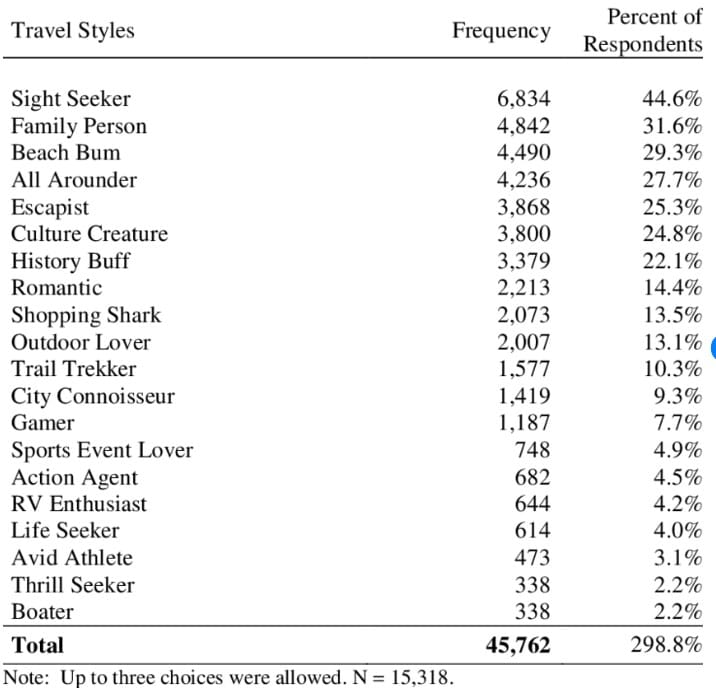
Most tourists aim for relaxation, entertainment, and recreational activities, especially leisure, adventure, family, and budget tourists.
By implication, this would include convenience from the day of booking a holiday destination to return travel home. Stringent and unreasonable visa requirements can deter potential visitors, and Mozambique provides a good example. The country experienced remarkable growth in tourist arrivals when it relaxed visa requirements and made it easier to obtain them online. According to the WOW report on the tourism industry in Mozambique, in the first 90 days of implementing a visa exemption, the number of visitors to the country increased by 34%.
How geo-location hinders tourism in Mozambique
Mozambique, like South Africa, does not have an ideal geo-location for some tourists coming from Europe, the US and Asia, as they might find a 12-hour flight with the possibility of a stopover too stressful when they are looking for relaxation. Those high value tourists, especially from Europe, might find North Africa more convenient particularly given their perfect summer weather months with coinciding traditional holiday periods. The table below illustrates tourist arrivals numbers according to Statista:
| Tourist arrivals 2023 | Million | Origination | |
| Egypt | 11.70 | Europe | 69% |
| Morocco | 10.90 | All other | 31% |
| Tunisia | 6.40 | ||
| South Africa | 5.70 | ||
| Mozambique | 0.43 |
Competitive pricing and good value for money play a critical role in attracting tourists. The weak local currency in Mozambique offers scope in terms of price, while entertainment and recreational activities are drawcards for bigger numbers of tourists.
Some countries with historic cities as drawcards have inherent advantages and may have proximity and internal efficiency in terms of transport. The numbers speak for themselves:
Cities in countries with the most international visitors in 2023 according to Mastercard
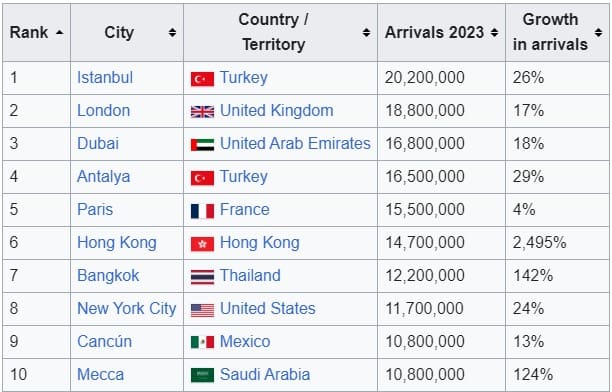
Mozambique’s opportunities to boost tourism
The country has started implementing strategies that are giving effect to essential improvements in the tourism space, and is making substantial funds available as reported by WOW and shown in the table.

Mozambique needs to improve infrastructure, security, logistics, and hospitality skills. It has faced security challenges in certain regions due to sporadic incidents of violence and unrest, particularly armed groups and civil unrest in Cabo Delgado which is of concern and has not been resolved.
Mozambique also needs to address the issue of a reliable and competitive procurement value chain. The WOW report on Mozambican tourism indicates that hotels are noticeably more expensive than South Africa due to higher procurement input costs. Lowering the costs of accommodation can attract tourists, especially those from long-distance destinations where tourists are already incurring high costs of transport due to distance.
The Club Med formula continues to be popular because tour guides make tourists feel welcome and provide information and assistance. While developed countries such as Sweden, Norway and New Zealand have started implementing sustainable tourism strategies for conscientious travellers who seek meaningful and responsible travel experiences, countries like Mozambique are grappling with strategies to increase the number of tourists.
Mozambique has great potential for tourism growth, underscored by its natural beauty and diverse ecosystems. While facing environmental and security challenges, the country can leverage relaxed visa policies and competitive pricing to attract more tourists.

